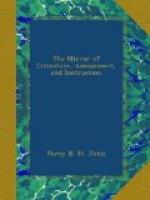“Do you mark yonder black marble slab, which is spread as over a tomb? It covers the most silvery fountain that ever mirrored the golden light of noon, or caught the fall of the evening dew, in an element bright as themselves. The radiant likeness of a spirit rests on those waters. I bade him give duration to the shadow he flung upon the wave, that I might gaze on it during his absence. The first act of my immortality was to shut it from my sight. There must that black marble rest for ever.”
[By the way, the ancients are excellent judges of beauty. Socrates calls beauty (we dare not use the contemptible it,) a short-lived tyranny: Xenophon says “Fire burns only when we are near it; but a beautiful face burns and inflames, though at a distance: Plato calls beauty a privilege of nature: Theophrastus (arch fellow,) a silent cheat: Theocritus, (cunning elf,) a delightful prejudice; Carneades, a solitary kingdom, (which he doubtless would keep to himself): Domitian says that nothing is more grateful, (not even killing flies); Aristotle affirms that beauty is better than all the letters of recommendation in the world: Homer, that it is a glorious gift of nature; and Ovid calls beauty a favour bestowed by the gods, which this same Ovid shows the gods to have been jealous of among mortals.” Certainly the moderns do not wage war for a beautiful woman, as did the ancients: we fear they would rather fight for an old castle.
To conclude, if, as Steele tells us, “to make happy is the true empire of beauty;” why, buy the Book of Beauty, to be sure.]
* * * * *
THE COMIC OFFERING
[Miss Sheridan presents us with her third volume of ladye mirth, as heretofore, over-flowing with fun and patter, and sprinkled with some sixty or seventy Cuts—many of them, to use a critical term, of “spirited design.” Probably, the most humorous tale among the fifty is—]




